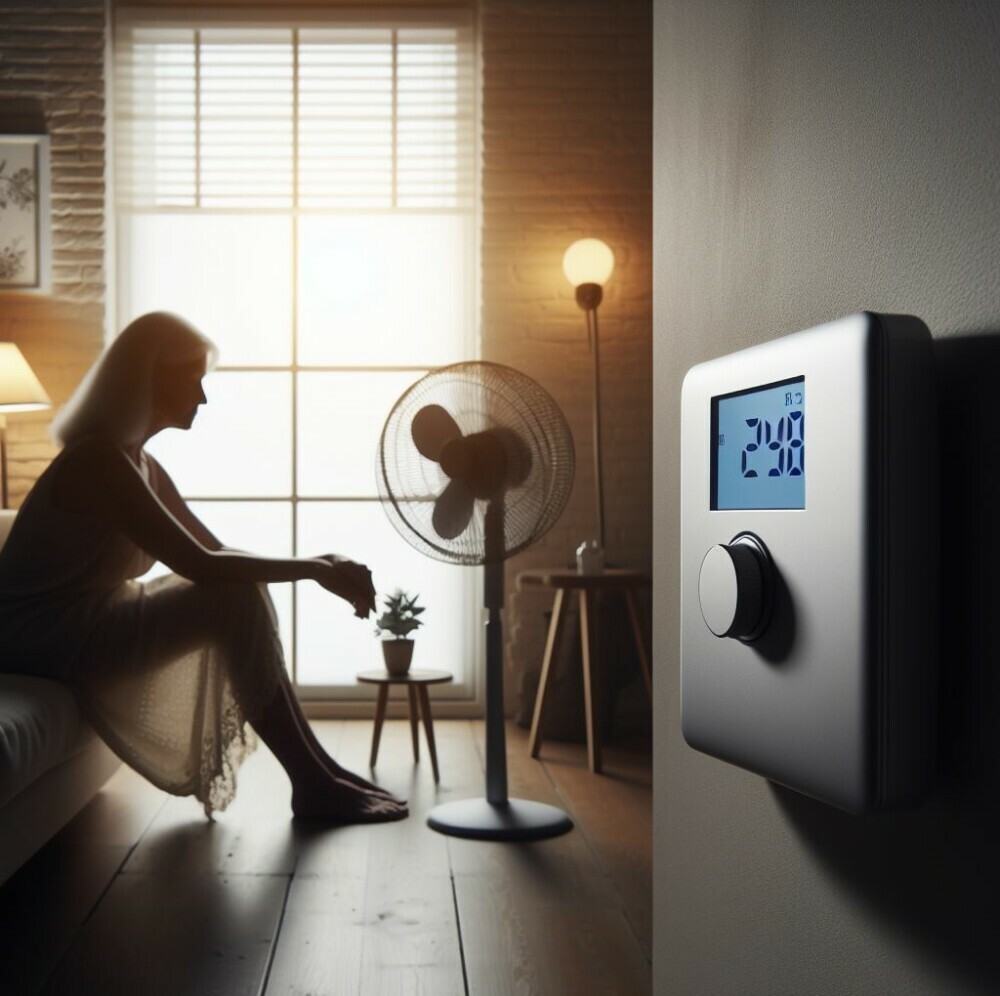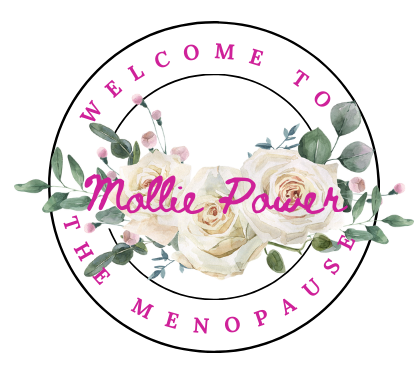
Menopause marks a significant transition in a woman’s life, characterised by the end of menstrual cycles and a host of physical and emotional changes. Among these, hot flashes stand out as a particularly discomforting symptom. Affecting approximately three-quarters of women, hot flashes can range from mild to severe, often disrupting daily routines and sleep patterns.
Imagine a sudden wave of heat spreading through your body, your skin flushing as sweat forms, and the disconcerting feeling that you have lost control over your internal thermostat. This is what many women experience regularly during menopause. Given their prevalence and impact, understanding, and managing hot flashes is crucial for maintaining comfort and quality of life during this natural phase.
In this exploration of menopause and hot flashes, I will share insight into why these sudden heat surges occur. Also, I will outline a range of effective strategies for staying comfortable during menopause. The aim is to arm you with knowledge and practical tips to tackle hot flashes head-on.
Stay tuned for the next section, where I will uncover the specific factors that can kickstart hot flashes. From hormonal imbalances and dietary influences on environmental factors and stress, knowing what may trigger these heat episodes is the first step in taking control.
Unveiling the Triggers of Hot Flashes
If you are curious about what sparks those sudden waves of heat during menopause, you are not alone. Many women experience hot flashes, and pinpointing the culprits is key to managing them. It is not just about discomfort; it is about understanding your body’s signals and responding effectively.
At the top of the list are HORMONAL CHANGES. Oestrogen, known to keep your body’s thermostat at a steady level, takes a dive during menopause. This drop can mess with your internal temperature settings, leading to those unexpected bouts of heat that seem to come out of nowhere.
Then, there’s stress and anxiety. It is not just about feeling frazzled. Anxiety has a PHYSIOLOGICAL IMPACT, stirring up adrenaline which can heat things up internally, bringing on a hot flash. Learning to tame the stress in your life may help dim the intensity of your hot flashes.
Your diet also might be a sneaky trigger. Spicy foods, a steaming cup of coffee, or a glass of wine can want to throw fuel on the fire for your body’s heat response. These dietary accomplices can make a hot flash strike with more fervour.
Think of your environment as the stage for hot flashes. A sizzling summer day or a stuffy room can provoke a hot flash episode. And do not underestimate clothing; the wrong outfit might as well be a thermal blanket when it comes to inviting a hot flash over.
Getting a handle on these triggers is more than simply avoiding annoyances; it is about regaining control over your body’s reactions during menopause. Armed with this knowledge, let us explore how to turn down the heat with targeted solutions.
Navigating Therapeutic Solutions
When it comes to hot flashes, individual experiences can vary widely. This variety means that what works for one person might not work for another. However, there are several therapeutic options available that many find beneficial.
For those dealing with severe or frequent hot flashes, hormone replacement therapy (HRT) might be a viable solution. It involves the administration of oestrogen, which can help stabilise the body’s temperature control and reduce the occurrence of hot flashes. Although effective, HRT is not suitable for everyone and comes with its own set of risks. I recommend consulting with a healthcare provider to weigh the benefits against potential downsides.
Besides HRT, non-hormonal prescription medications, such as certain antidepressants and blood pressure drugs, have also been used to treat hot flashes. While not originally developed for this purpose, they have provided relief for some women.
Outside the realm of prescription medications, stress reduction has shown promise in managing hot flashes. Techniques like deep breathing exercises, meditation, and practicing yoga or tai chi can help lower stress and anxiety levels, potentially reducing the frequency of hot flashes. A regular practice of these techniques can offer a sense of control and well-being that extends beyond the management of menopausal symptoms.
Furthermore, some women find relief through dietary adjustments. While I have seen reports about various diet plans that claim to ease menopausal symptoms, the key is often to avoid known triggers like spicy foods, caffeine, and alcohol—instead, focusing on a balanced diet rich in fruits, vegetables, and whole grains.
Lastly, a number of herbal supplements have gained popularity. Black cohosh, evening primrose oil, and soy isoflavones are among the most commonly cited. However, it is important to proceed with caution, as the efficacy and safety of these supplements have not been universally proven. ALWAYS discuss such options with a healthcare provider to ensure they are safe for your individual health needs.
In the next section, I will delve into practical lifestyle adjustments that can work in tandem with these therapeutic solutions, offering additional comfort and relief from menopausal symptoms.
Adopting Lifestyle Modifications for Menopause Comfort
Adjusting to the varied challenges of menopause often requires a multi-faceted approach. Comfort can often be found in the slight changes you make in everyday habits. Let us explore several lifestyle alterations that can ease hot flashes and enhance overall wellbeing during this phase of life.
A cool environment is key in minimising discomfort. This might mean adjusting the thermostat, using fans, or selecting bedding that breathes. Bedrooms should be sanctuaries designed for coolness, especially during the night when hot flashes are frequent culprits of sleep disturbance.
Clothing choices play an underrated role in managing menopause, opt for lightweight and loose-fitting clothing made of natural fibres. These allow your skin to breathe and can be removed or added easily as body temperatures fluctuate. Also, keep a change of clothes on hand for sudden heat surges.
Hydration is your ally. Increase your water intake to compensate for the loss from sweating. Some women also find that sipping cool water at the onset of a hot flash can be calming.
Do not underestimate the power of a consistent exercise regime. Physical activity can help regulate hormones and reduce stress. However, be mindful of the type and timing of exercise as overly vigorous workouts close to bedtime might exacerbate hot flashes.
Sleep hygiene cannot be overlooked. Establish a relaxing bedtime routine, keep the bedroom cool and dark, and try to go to bed at the same time each night. Although hot flashes can interrupt sleep, creating an environment conducive to rest helps counteract these disturbances.
These lifestyle adjustments may seem simple, but they have the potential to significantly alleviate the discomfort of hot flashes. By making thoughtful choices about your environment, clothing, hydration, exercise, and sleep, you can take charge of your menopausal comfort. Next, we will discuss how personal strategies and support play a role in finding your own path through menopause.
Finding Personalised Strategies and Support
Menopause is undeniably a personal journey, and so are the hot flashes that often accompany it. What works for one person may not be as effective for another, and that is okay. It underscores the value of personalised strategies in managing your symptoms. To achieve the best results, you should consider all factors: your lifestyle, medical history, and comfort preferences.
Communication with healthcare providers is essential. They can provide advice based on your specific situation and guide you through options like hormone replacement therapy, if suitable. They can also warn you about any potential complications associated with herbal remedies or other alternative treatments, helping to ensure your safety.
Equally important is the support you can find outside the doctor’s office. Support groups—whether in person or online—offer a wealth of shared experiences and coping strategies. Sometimes, the most practical advice comes from someone who has walked the path before you and can empathise with your situation.
In conclusion, while the unpredictable nature of hot flashes can be daunting, you are not without defence. By staying informed, exploring various remedies, and seeking support, you can navigate this chapter of your life with greater ease and confidence. Your menopause experience is yours to shape, and with the right strategy and support network, you can ensure it is as comfortable as possible.
